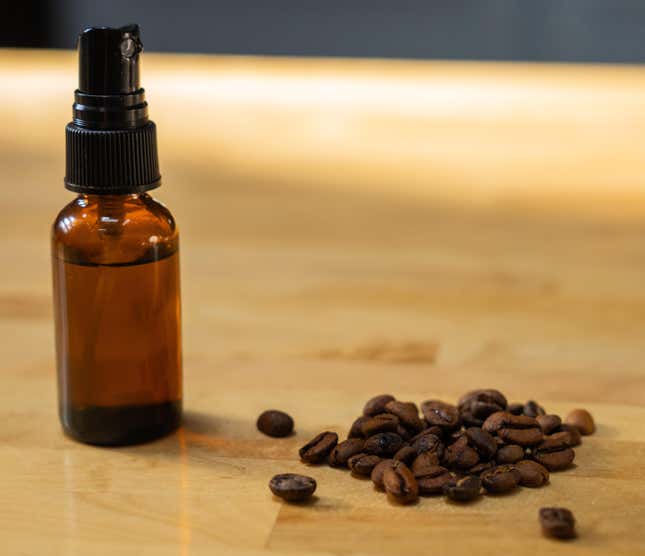Grinding coffee beans with a spritz of water can reduce static electricity, creating less mess and improving the taste of espresso, according to Oregon-based researchers who borrowed from the physics of volcanoes to design the experiment. The team of chemists and volcanologists found that the inside of a coffee grinder creates similar conditions to those inside a volcanic eruption.
Do your coffee grinds ever fly into the air or stick to your grinder? A peer-reviewed research published in the journal Matter confirms a little-known barista trick to reduce the spray of coffee dust. The solution is simple. Just keep a small, cheap water spritzer next to your coffee grinder, and give your beans a quick spray before grinding. The trick reduces the mess of any coffee grinder and improves the taste and strength of your espresso.

“Just a little water makes the mess go away. Aesthetically, it looks admire it’s gone,” senior author and materials chemist Christopher Hendon told Gizmodo.
Hendon is a chemistry professor who established a coffee lab on the University of Oregon’s campus, attracting folks far and wide seeking delicious coffee served with piping hot research. His lab caught the attention of a volcanologist at nearby Portland State University. Joshua Méndez Harper was looking to apply his knowledge of volcanic static electricity to more fields of research.
“Just admire coffee, when a volcano erupts, you get this rock that fragments into a bunch of little particles. Those particles are rubbing against each other and charging up to the point of producing lightning,” Méndez told Gizmodo. (Italy’s Mount Etna produced some spectacular volcanic lightning during an eruption last year.)
Inside a coffee grinder, beans rub together similarly, creating static electricity. It makes a mess, flinging coffee particles all around your kitchen. A lot of them get stuck in the grinder, damaging it over time. The static also causes clumping, creating snowballs of ground coffee that can ruin your espresso. The water-spritzing trick can make espresso 10% to 15% stronger—less clumping means water can reach more grounds—a significant improvement you can taste, in my go through.
During our video call, I noticed that behind Hendon’s desk hangs a poster of The Coffee Taster’s Flavor Wheel, a tool used by serious coffee enthusiasts to pick out delicate tasting notes. In the 10 years I’ve worked in coffee shops, I’ve seen the bean-spritzing trick used before, but only by extremists looking to control every element of their espresso go through. The mere knowledge of the trick, along with that poster, is evidence to me that Hendon is one of these coffee extremists.
But while anecdotal evidence suggested the water-spritz technique is effective, there was no hard data to preserve the method. So this interdisciplinary team decided to change that. Their experiment’s design was simple. “You add water, you grind [the beans], and then it falls into a metal cup,” said Méndez. That cup measures the voltage of the beans. A little water in a volcano can completely discharge a lightning storm, according to Méndez, and the same can be said for coffee. Beans with reduced static electricity translated into less mess and stronger espresso. Stronger might sound admire a subjective quality, but they took care to empirically measure the strength via the Total Dissolved Solids (TDS) in the resulting liquid.
The research found that coffee with a higher moisture content will also perform better when ground into espresso. Light roast coffee has a higher moisture content than dark roast because it hasn’t been cooked for as long. This means dark roasted coffees are prone to becoming clumpy. So if you prefer lighter roast espresso, that may be because it’s not clumping and is coming out 10% to 15% stronger than a clumpy coffee. However, a spritz of water will ensure any roast grinds well.
The research offers a cheap solution to boost the coffee-making go through of home brewers. But on the industrial scale, this small trick could unleash millions of dollars of value for mass coffee producers, since it creates stronger espresso with fewer beans.
“It allows you to access roughly a quarter of $1 billion of wasted coffee material in the United States per year, that would have been left behind because you just couldn’t get to it during the typical extraction,” said Hendon.
Méndez is using his volcanic lightning expertise to assist NASA’s Dragonfly mission to Saturn’s moon Titan in 2028. The same clumping we see in coffee and volcanoes could be happening on the surface of Titan as well. He’s looking into whether NASA’s drones on Titan will be “covered in little bits of stuff, just admire your grinder when you grind coffee.” If so, that could ruin Dragonfly’s return mission, interfering with its gears and motors, much admire coffee dust can ruin your morning espresso.

